Timeline of The Global Fund to Fight AIDS, Tuberculosis and Malaria
The present is a timeline of the Global Fund to Fight AIDS, Tuberculosis and Malaria, attempting to describe major events concerning the organization.
Big picture
| Year/period | Key developments |
|---|---|
| < 2002 | Prior to the Global Fund foundation, AIDS, tuberculosis and malaria together are calculated to cause several millions of deaths per year.[1] |
| 2002–2013 | The Global Fund is born, starting operations via a ‘rounds-based model’ whereby proposals from eligible geographical locations are developed and submitted during designated funding windows, with guidance from the Global Fund and its partners.[2] By 2007, the organization would cumulate helping distribution of more than 50 million bed nets.[3] |
| 2013 < | The Global Fund adopts new strategy, eliminating rounds-base models and determining funding allocations for each eligible country based on calculations of country income and national disease burden.[2] |
| Recent years | The Global Fund is today the world's largest financier of anti-AIDS, tuberculosis and malaria programs. As of September 2016, the organization has disbursed US$30 billion to countries and communities in need.[4] |
Full timeline
| Year/period | Month and date | Type of event | Event | Location |
|---|---|---|---|---|
| 1993 | Antecedent | The World Health Organization declares tuberculosis a "global public health emergency".[5] | ||
| 2000 | January | Antecedent | The United Nations Security Council calls an unprecedented session on the threat to Sub-Saharan Africa of HIV/AIDS, and prompts the United States government to appoint a National Science Council on the security threat posed by Emerging and Re-Emerging Infectious Diseases.[5] | |
| 2000 | July | Antecedent | Discussions on the creation of a Fund are held at the 26th G8 summit.[5] | Japan (Okinawa) |
| 2000 | December | Antecedent | United States president Bill Clinton publicly declares AIDS an international security threat at a World AIDS Day commemoration.[5] | |
| 2001 | Background | HIV/AIDS, tuberculosis and malaria together account for 11.4% of all disability-adjusted life-years (DALYs) globally and 31.5% in Africa.[5] | ||
| 2001 | April | Antecedent | The foundation of the Global Fund is made concrete by Secretary-General of the United Nations Kofi Annan's call to action.[5] | |
| 2001 | May 3 | Contribution | Secretary-General of the United Nations Kofi Annan announces that he would donate his US$100,000 award money from the Philadelphia Liberty Medal to the new Global Fund, thus making the first private contribution.[6] | |
| 2001 | June | Antecedent | The foundation of the Global Fund is supported by the United Nations General Assembly Special Session on HIV/AIDS (UNGASS).[5] | |
| 2001 | June | Contribution | The Massive Effort Campaign mobilizes the first larger corporate contribution to the Global Fund from Credit Suisse/Winterthur Group for US$1 million.[7] | |
| 2001 | June 19 | Contribution | The Bill & Melinda Gates Foundation announces that it would commit $100 million to the Global Fund over a multi-year period, and uses the occasion to call on other organizations and governments around the world to support the new fund.[8] | |
| 2001 | July | Antecedent | The foundation of the Global Fund is supported by the 27th G8 summit.[5] | Italy (Genoa) |
| 2002 | January | Foundation | The Global Fund to Fight AIDS, Tuberculosis and Malaria is established as a private Swiss foundation to increase spending for the prevention and treatment for the three diseases.[9][1][10] The Board meets for the first time, at which point the Fund adopts its by-laws and begins operations.[11] | Switzerland (Geneva) |
| 2002 | February | Administration | The Global Fund launches its Round 1 Call for Proposals.[1] | |
| 2002 | April | Administration | The Global Fund announces its first round of grants, through which $616 million for 36 countries would be dispersed over two years.[9][5][1] | |
| 2002 | July | Administration | In his speech to the XIV International AIDS Conference in Barcelona, Global Fund executive director Richard Feachem states that the first round of grants "will double the current number of people receiving Highly Active Anti-Retroviral Therapy (HAART) in the developing world and in Africa HAART recipients will increase six fold as a result of these commitments".[5] | |
| 2002 | October | Report | Until date, governments, corporations, foundations, and individuals have pledged approximately $2.1 billion to the Global Fund.[12] | |
| 2002 | December | Administration | The Global Fund disburses its first US$1 million.[1] | |
| 2003 | Administration | The Global Fund adopts a three-year replenishment model to guarantee countries of sustained and predictable financial support for their programs.[13] | ||
| 2003 | January | Administration | The Global Fund Fourth Board Meeting approves the second round of grant proposals (US$900 million in grants to 72 countries).[9][1] | |
| 2003 | August | Report | The total disbursements by the Global Fund to countries surpass US$100 million.[1] | |
| 2003 | October | Administration | The Sixth Board Meeting by the Global Fund is held. The Board approves third round of grant proposals (more than US$600 million for 61 countries).[9][1] | Thailand (Chiang Mai) |
| 2003 | December | Report | Disbursements at the end of 2003 by the Global Fund totals US$232 million.[1] | |
| 2004 | March | Administration | The Global Funds holds its Seventh Board Meeting. Round 4 Call for Proposals is launched.[1] | Switzerland (Geneva) |
| 2004 | June | Administration | The Global Funds holds its Eighth Board Meeting. The Board approves fourth round of grant proposals (US$968 million for 69 grants in 50 countries).[9][1] | Switzerland (Geneva) |
| 2005 | March | Report | The Global Fund reports that across all grants, it has provided antiretroviral treatment to 130,000 people with AIDS, tested 1,000,000 people voluntarily for HIV, supported 385,000 tuberculosis patients with directly observed short-course therapy, given more than 300,000 people new, more effective treatments for malaria, and supplied more than 1.35 million families with insecticide-treated mosquito nets.[9] | |
| 2005 | April 25 | Administration | The Global Fund approves 33 grants to enter phase 2.[9] | |
| 2005 | July | Administration | The Board of the Global Fund establishes the Office of the Inspector General, which operates as an independent unit of the Global Fund, reporting directly to the Board.[14] | |
| 2005 | August | Withdrawal | The Global Fund withdraws from Burma due to new local government restrictions to project sites and more complicated regulations regarding the procurement of medical supplies.[15] | Burma |
| 2005 | September | Administration | The Global Fund holds its Eleventh Board Meeting. The Round 5 proposals are approved for US$382 million for 26 grants in 20 countries.[1] | Switzerland (Geneva) |
| 2005 | December | Administration | The Global Fund holds its Twelfth Board Meeting. The Board votes to fully fund Round 5, allocating new grants for US$719 million.[1] | Morocco (Marrakesh) |
| 2007 | March | Administration | Following a competitive selection process, French physician Michel Kazatchkine is selected as the Fund’s new executive director.[11] | |
| 2007 | September | Administration | The Global Fund concludes its Second Replenishment with a total amount of US$9.7 billion pledged for the period 2008–2010.[1] | |
| 2007 | November | Administration | The Global Fund holds its Sixteenth Board Meeting. The Board approves 73 grants in Round 7 of funding for a total of US$1.1 billion, for 136 countries.[1] | China (Kunming) |
| 2008 | Policy | The Global Fund introduces the possibility for countries to apply for a separate funding stream to support “proven and effective interventions . . . that address the three diseases in ways that will contribute to strengthening health systems”.[14] | ||
| 2008 | Administration | The Global Fund starts to promote the inclusion of Operational/implementation research (OR/IR) activities in disease control programs it supports.[16] | ||
| 2008 | November | Administration | The Global Fund holds its Eighteenth Board Meeting. The Board approves 94 Round 8 grants for a total value of US$2.75 billion (the highest amount ever approved). The Round 9 Call for Proposals is launched.[1] | India (New Delhi) |
| 2009 | Program launch | The Global Fund launches the First Learning Wave of National Strategy Applications in an "effort to contribute to broader health systems strengthening".[14] | ||
| 2009 | November | Administration | The Global Fund holds its Twentieth Board Meeting. The Board approves Round 9 grants for a total value of US$2.4 billion.[1] | Ethiopia (Addis Abeba) |
| 2010 | Administration | Round 10 releases a series of information notes on harm reduction, making clear that the Global Fund “supports evidence-based interventions aimed at ensuring that key populations have access to HIV prevention, treatment, care and support … [including] the comprehensive package for the prevention, treatment and care of HIV among people who inject drugs”.[2] | ||
| 2010 | March | Program launch | The preparatory meeting for the Third Replenishment is held. Global Fund launches its Born HIV Free campaign, with aims at contributing to the effort for preventing children to be born with HIV.[17][1] | Netherlands (The Hague) |
| 2010 | October | Contribution | The United States president Barack Obama administration announces a three-year (FY11-FY13), $4 billion pledge to the Global Fund. It would be the first time the United States make a multi-year pledge to the Global Fund.[18] | |
| 2011 | January | Controversy | American news agency Associated Press (AP) publishes an article calling attention to several instances of fraud and corruption at the Global Fund. The article focuses on allegations of corruption and fraud in 4 of the 145 countries that receive Global Fund grants: Mali, Djibouti, Mauritania, and Zambia.[19] The Fund would respond in April with its own report, reiterating the Fund’s “zero-tolerance” approach to corruption, and publicizing the “$44 million in fraudulent, unsupported, or ineligible expenditures” which it attempts to recoup.[11] | |
| 2011 | May | Administration | The Board approves the new Eligibility Counterpart Financing and Prioritization Policy, which affects the way Global Fund resources are provided. Fund resources are divided into two accounts: the General Funding Pool (intended for countries with large disease burdens and limited domestic resources) and the Targeted Funding Pool.[19] | |
| 2011 | June 23 | Collaboration | The Global Fund announces having signed an agreement with the International Aid Transparency Initiative, a multilateral effort (including donors, countries, and civil society organizations) to publicly disclose aid data in a standardized, timely approach.[19] | |
| 2012 | Report | Data released from analysis from Round 1 (2002) to Round 9 (2009) shows that the Global Fund has invested or approved US$ 430 million for activities that specifically targets people who inject drugs.[2] | ||
| 2013 | Program launch | The Global Fund’s Regional Artemisinin-resistance Initiative (RAI) is launched in response to the emergence of drug-resistant malaria in the Greater Mekong region, first noted in Cambodia and Thailand and later Myanmar, Laos and Viet Nam. RAI would purchase and distribute insecticide-treated nets, diagnostic tests, and drugs.[20] | Cambodia, Thailand, Myanmar, Laos, Viet Nam | |
| 2013 | February | Administration | The Global Fund announces a new funding model, under which funding allocations would be determined for each eligible country based on calculations of country income and national disease burden.[2] | |
| 2013 | March | Administration | The Global Fund starts transitioning into its new funding model by inviting select early applicants and interim applicants to submit concept notes for funding.[1] | |
| 2013 | June | Administration | The Global Fund's Twenty-ninth Board Meeting is held. Among other decisions, a new Inspector General is appointed. Also, the Board awards grants to the first three countries to receive funding under the new funding model.[1] | Sri Lanka (Colombo) |
| 2013 | December | Contribution | The United States president Barack Obama administration at the White House hosts the Global Fund’s Fourth Replenishment, and launches the 2014–2016 replenishment cycle with a total amount of US$12 billion pledged.[1] | United States (Washington D.C.) |
| 2014 | Administration | The Global Fund starts new funding model.[2] | ||
| 2014 | Background | Tuberculosis kills 1.5 million people during the year and 9.6 million people are estimated to have fallen ill with the disease.[21] | ||
| 2014 | March | Administration | Board Members at meeting finalize key elements of the new funding model, set aside money for various special initiatives and appoint committee members at the Thirty-First Board Meeting.[1] | Indonesia (Jakarta) |
| 2014 | March | Contribution | The United Kingdom charity Comic Relief announces that it has raised £2 million for the Global Fund.[1] | |
| 2015 | Backround | 214 million cases of malaria are reported during the year resulting in 438,000 deaths. Also, 1.1 million people would die of AIDS-related illnesses in 2015.[21] | ||
| 2015 | Administration | The proportion of the Global Fund’s investments focused on girls and women increases to 60%, from 46% in 2010.[22] | ||
| 2016 | September 1 | Report | The Global Fund announces having supported programs that saved 20 million lives.[23] | |
| 2016 | September | Administration | The Global Fund holds the Pledging conference for its Fifth Replenishment, hosted by Canadian Prime Minister Justin Trudeau. Donor countries, foundations, and private donors pledge US$12.9 billion for the 2017–2019 period. [1] | Canada (Montreal) |
| 2017 | Program launch | The Global Fund, along with the United Nations Development Programme (UNDP) launch the use of Mobile Clinics to Improve Diagnosis and Treatment of Tuberculosis in Remote Areas in Sudan.[24] | Sudan | |
| 2018 | Year round | Contribution | The Global Fund helps diagnose 220 million suspected malaria cases, treat 110 million malaria cases and distribute 131 million bed nets.[25] | |
| 2019 | July | Contribution | As of date, the Global Fund had approved more than US$49 billion in funding, with disbursement surpassing US$42 billion to over 120 countries. An estimated 27 million lives were saved by these investments.[18] | |
| 2019 | October 10 | Contribution | The Global found announces new funding commitments at the Global Fund’s Sixth Replenishment Conference in Lyon hosted by the Government of France. The pledges, amounting to US$ 14.02 billion, would cover a three-year period (2020-2022) to finance the fight against HIV, tuberculosis and malaria.[26] | France |
| 2019 | October 11 | Recognition | American business magnate Bill Gates writes about The Global Fund, praising the organization for helping "drive phenomenal progress on AIDS, tuberculosis, and malaria in the world’s poorest countries".[3] |
Numerical and visual data
Google Scholar
The following table summarizes per-year mentions on Google Scholar as of December 18, 2021.
| Year | "The Global Fund" |
|---|---|
| 2002 | 503 |
| 2003 | 776 |
| 2004 | 1,230 |
| 2005 | 1,240 |
| 2006 | 1,540 |
| 2007 | 1,750 |
| 2008 | 2,040 |
| 2009 | 2,190 |
| 2010 | 2,300 |
| 2011 | 2,480 |
| 2012 | 2,560 |
| 2013 | 2,670 |
| 2014 | 2,360 |
| 2015 | 2,480 |
| 2016 | 2,400 |
| 2017 | 2,360 |
| 2018 | 2,250 |
| 2019 | 2,130 |
| 2020 | 2,360 |
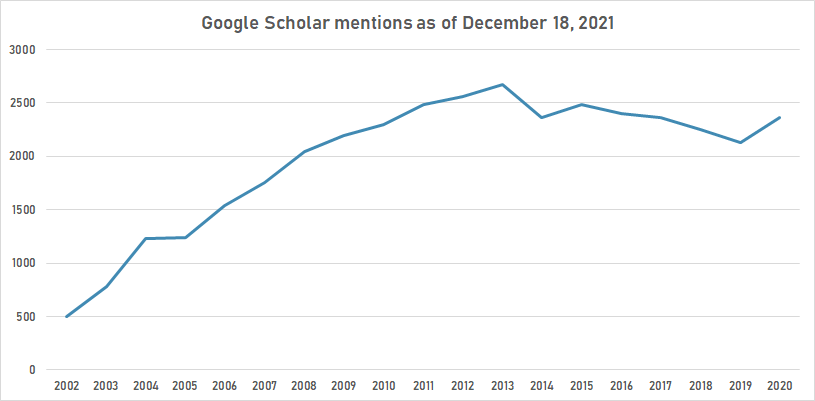
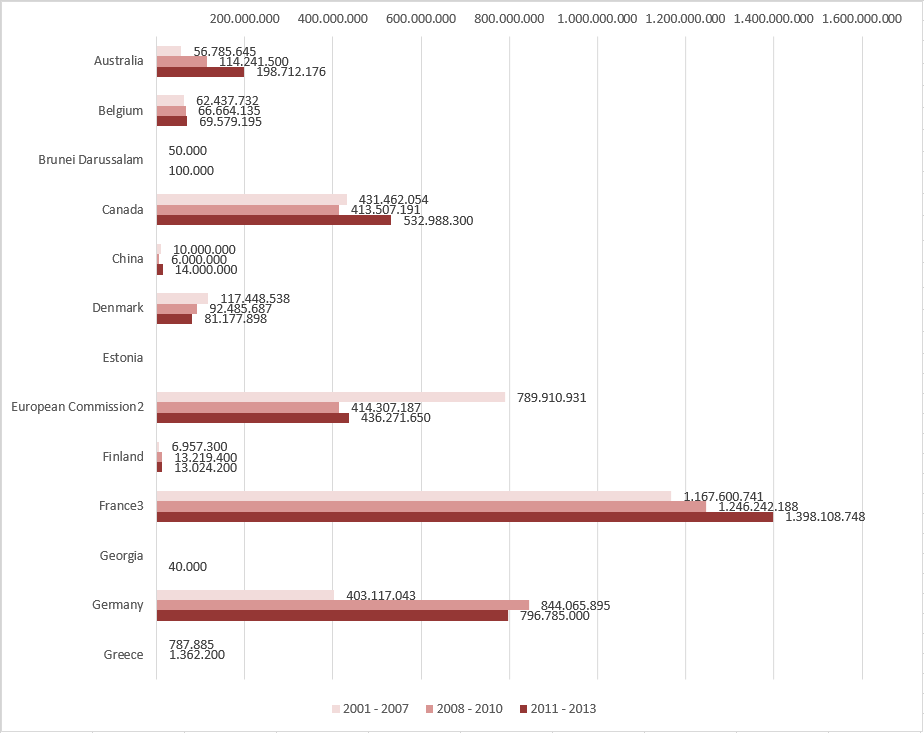
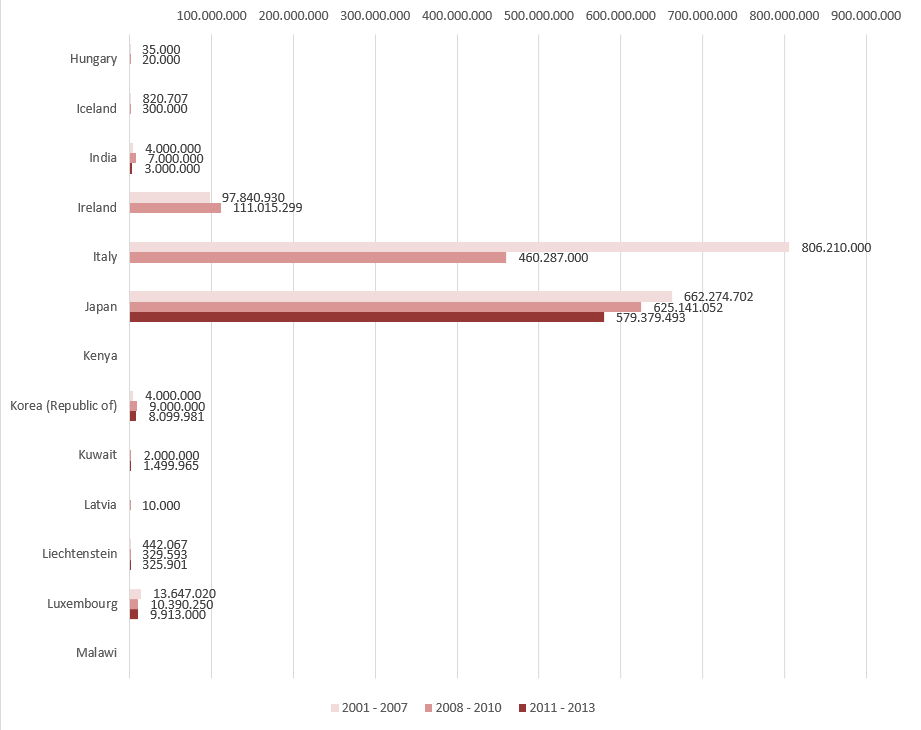
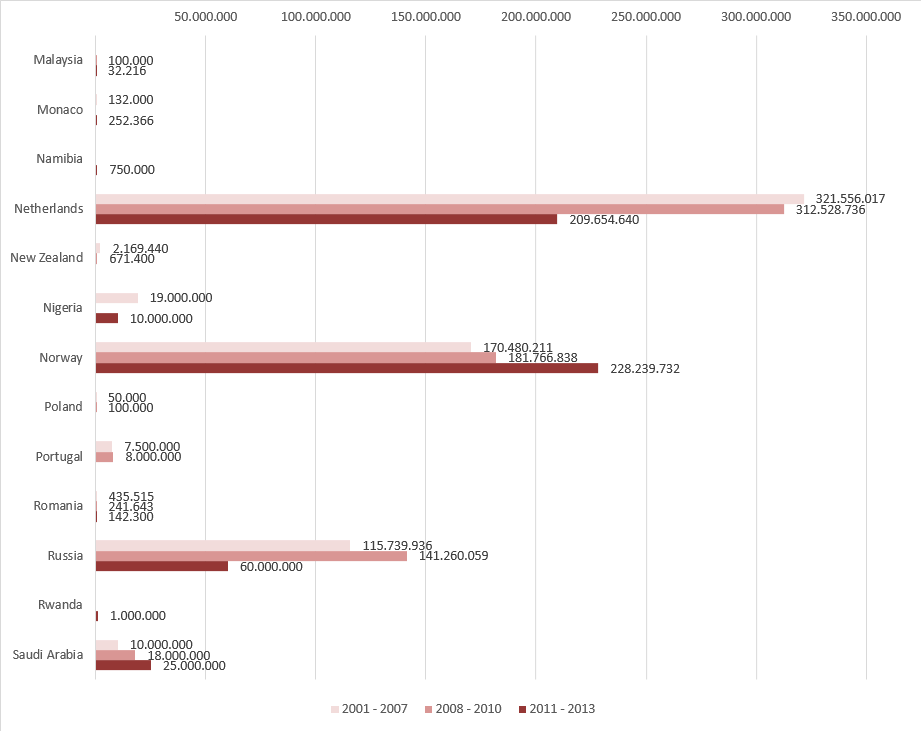
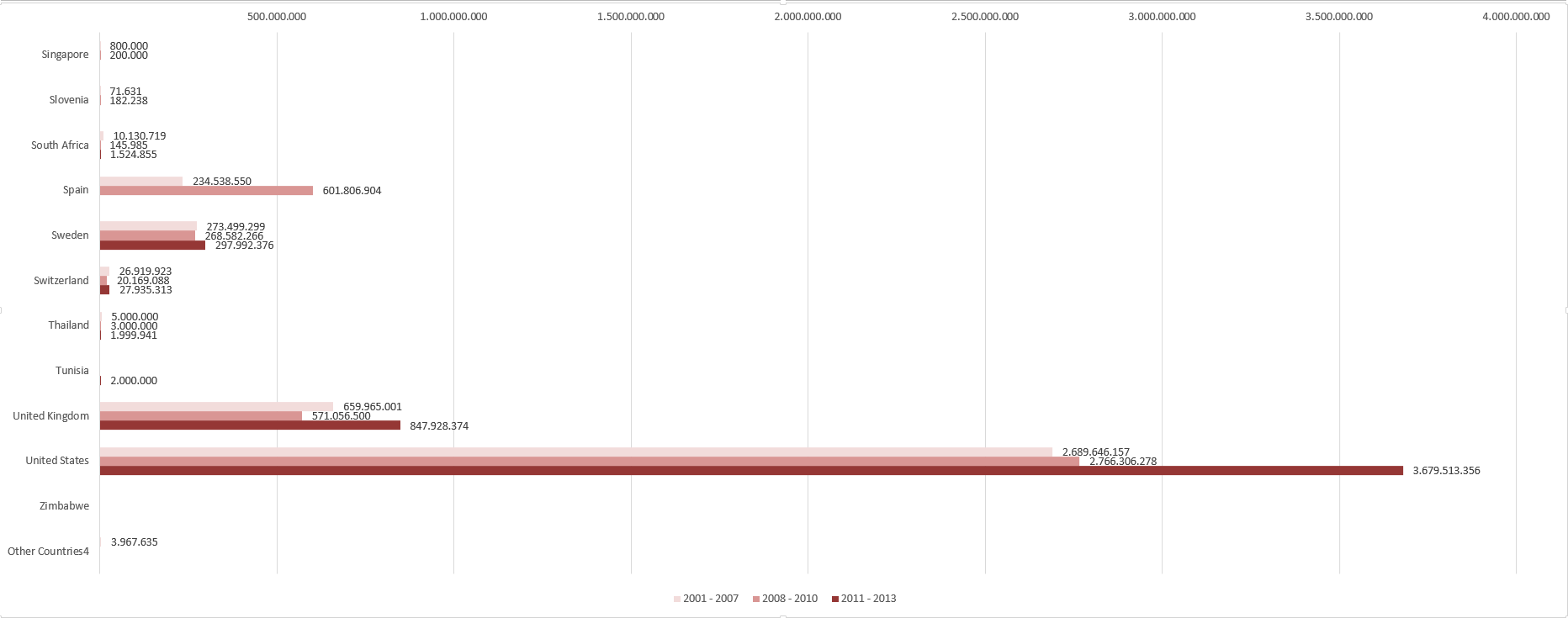
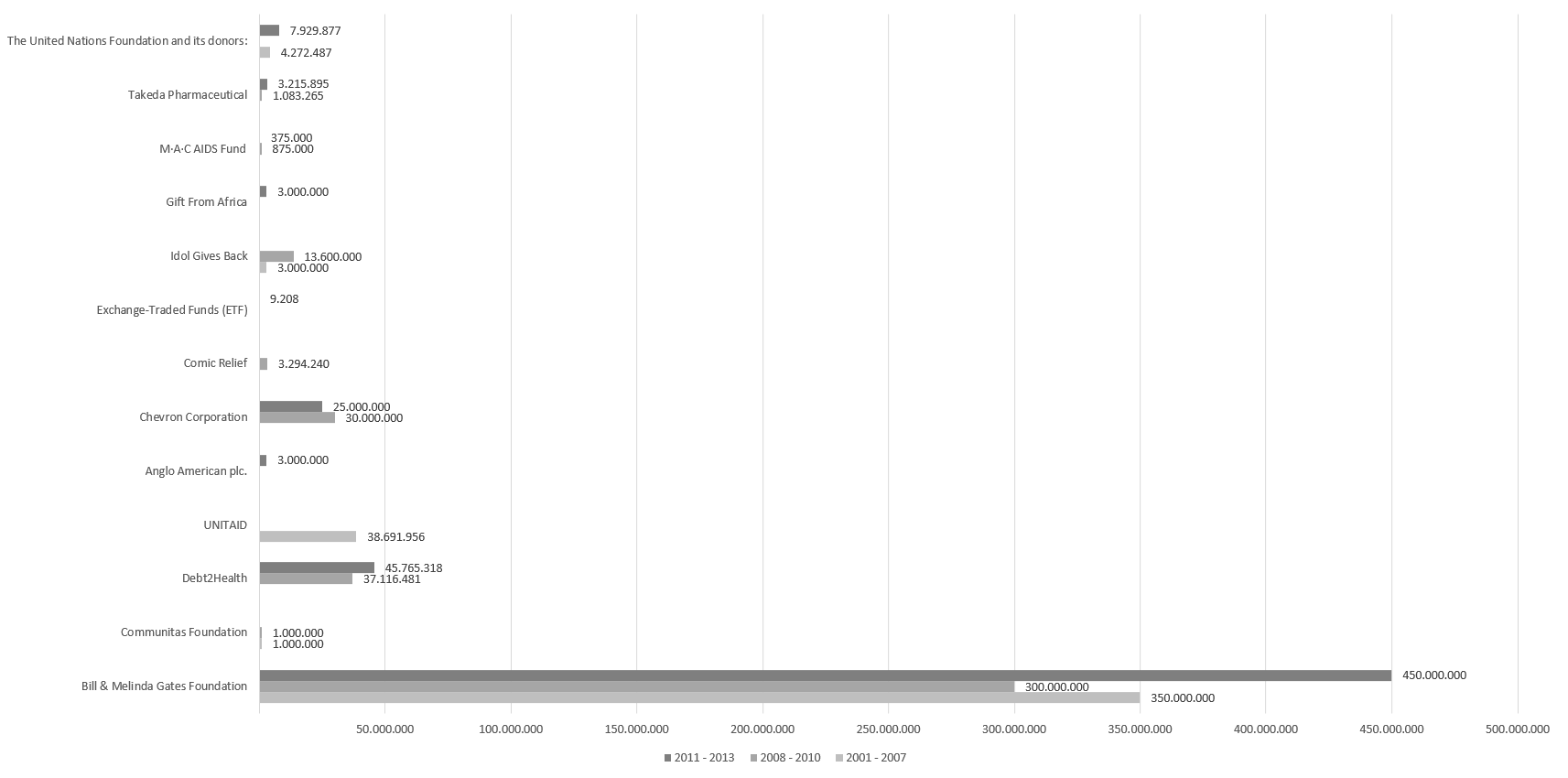
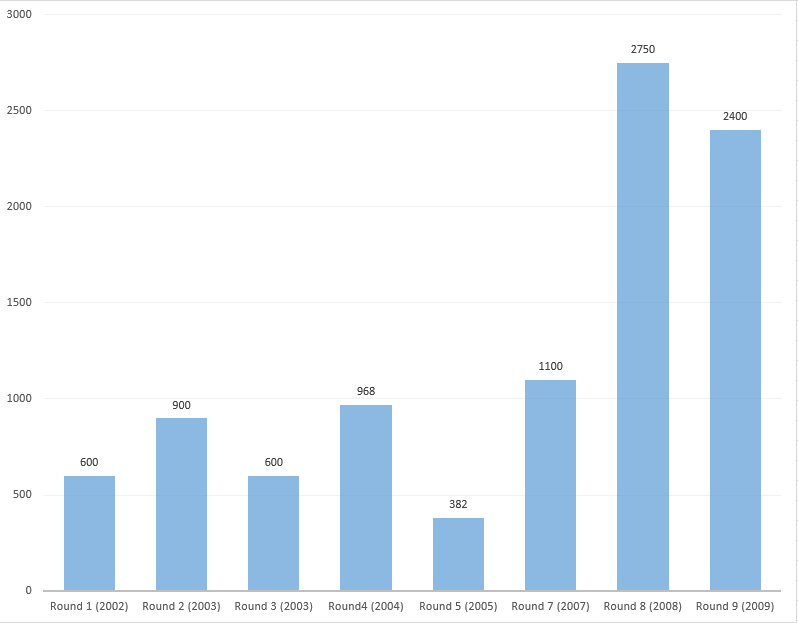
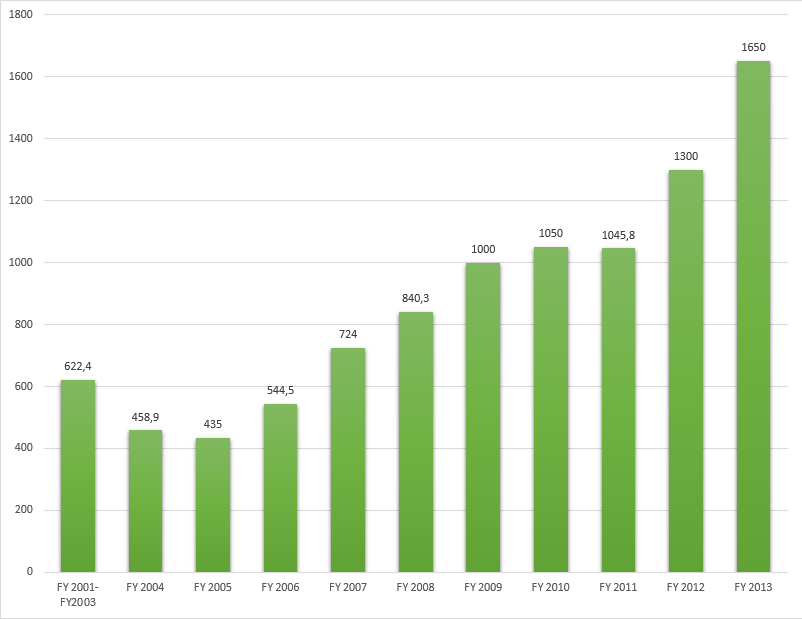
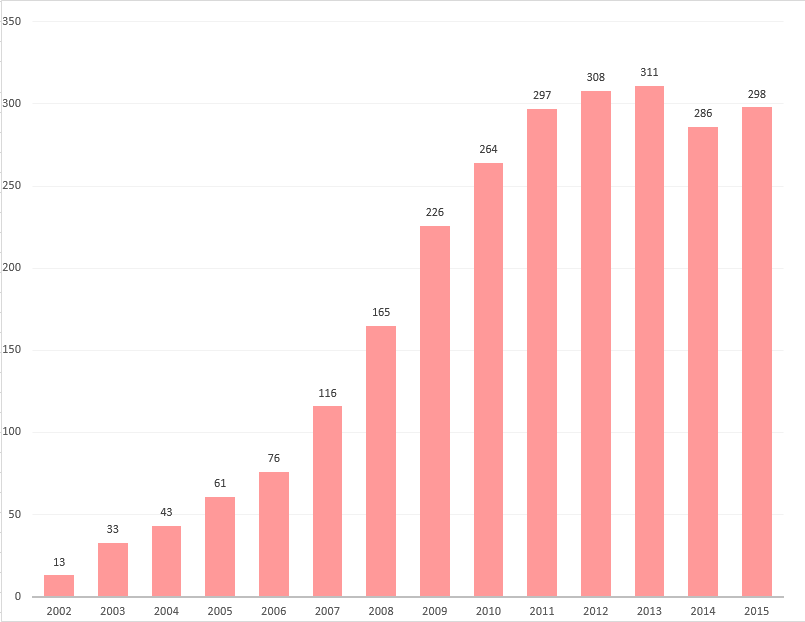
Google Trends
The image below shows Google Trends data for The Global Fund to Fight AIDS, Tuberculosis and Malaria (Topic) from January 2004 to February 2021, when the screenshot was taken. Interest is also ranked by country and displayed on world map.[27]
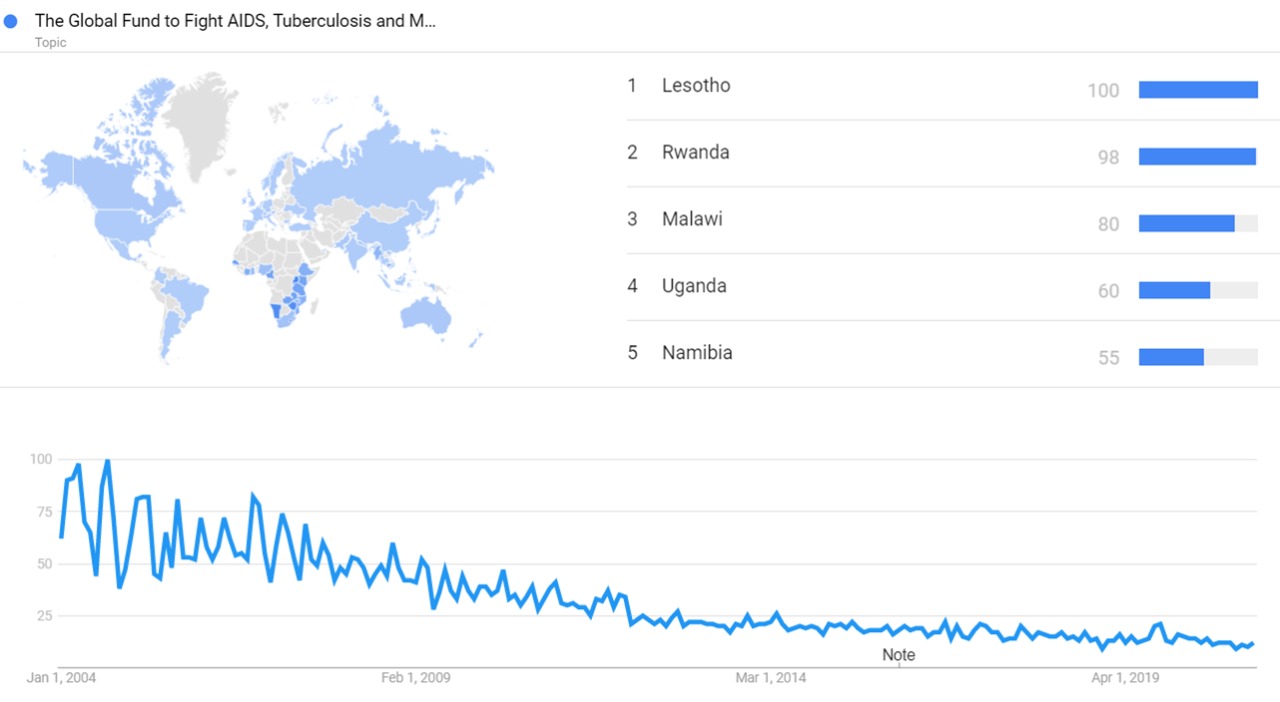
Google Ngram Viewer
The chart below shows Google Ngram Viewer data for The Global Fund from 2002 to 2019.[28]

Wikipedia Views
The chart below shows pageviews of the English Wikipedia article Global Fund to Fight AIDS, Tuberculosis and Malaria on desktop, on mobile-web, desktop-spider,mobile-web-spider and mobile app, from July 2015; to January 2021.[29]
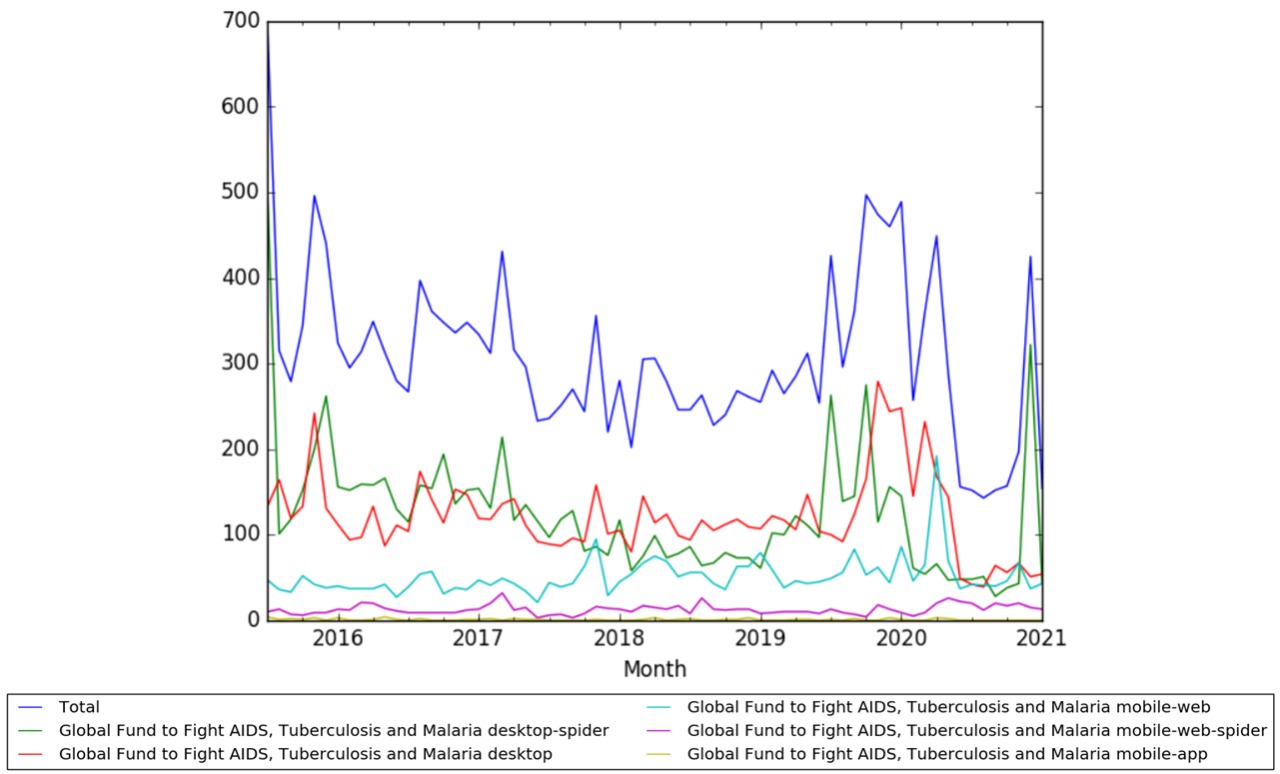
See also
- Timeline of malaria
- Timeline of tuberculosis
- Timeline of HIV/AIDS
- Timeline of global health
- Combined timeline of malaria organizations
External links
References
- ↑ 1.00 1.01 1.02 1.03 1.04 1.05 1.06 1.07 1.08 1.09 1.10 1.11 1.12 1.13 1.14 1.15 1.16 1.17 1.18 1.19 1.20 1.21 1.22 1.23 "theglobalfund.org". Global Fund Overview. Retrieved 5 May 2017.
- ↑ 2.0 2.1 2.2 2.3 2.4 2.5 "The Global Fund to Fight AIDS, Tuberculosis and Malaria's investments in harm reduction through the rounds-based funding model (2002–2014)". doi:10.1016/j.drugpo.2015.08.001. Retrieved 5 May 2017.
{{cite journal}}: Cite journal requires|journal=(help) - ↑ 3.0 3.1 "The world is uniting to help this group". gatesnotes.com. Retrieved 21 October 2019.
- ↑ "Global Fund collects almost USD 13 bn for AIDS, malaria and TB". business-standard.com. Retrieved 6 May 2017.
- ↑ 5.00 5.01 5.02 5.03 5.04 5.05 5.06 5.07 5.08 5.09 "Global plagues and the Global Fund: Challenges in the fight against HIV, TB and malaria". biomedcentral.com. doi:10.1186/1472-698X-3-2. Retrieved 29 April 2017.
{{cite web}}: CS1 maint: unflagged free DOI (link) - ↑ "Annan gives prize money to AIDS Fund". nature.com. doi:10.1038/88998. Retrieved 6 May 2017.
- ↑ From U.S. Centers for Disease Control and Prevention. "Winterthur Insurance provides the first major corporate contribution to the Global Fund". Thebody.com. Retrieved 2017-05-06.
- ↑ "Gates Announces $100 Commitment to the Global Fund". Gates Foundation. 2001-06-19. Retrieved 2017-05-06.
- ↑ 9.0 9.1 9.2 9.3 9.4 9.5 9.6 Global health the Global Fund to fight AIDS, TB and malaria is responding to challenges but needs better information and documentation for performancebased funding : report to congressional committees. Retrieved 29 April 2017.
- ↑ "The Global Fund to Fight AIDS, Tuberculosis and Malaria: 10 years on". nih.gov. Retrieved 6 May 2017.
- ↑ 11.0 11.1 11.2 "he Global Fund to Fight AIDS, Tuberculosis, and Malaria" (PDF). cgdev.org. Retrieved 6 May 2017.
- ↑ "Global Fund To Fight AIDS, Tuberculosis, and Malaria". state.gov. Retrieved 6 May 2017.
- ↑ "The Global Fund to Fight AIDS, Tuberculosis and Malaria". gbchealth.org. Retrieved 7 May 2017.
- ↑ 14.0 14.1 14.2 "The Global Fund to Fight AIDS, TB and Malaria & Health Systems Strengtheni ng: An Organizational and Policy Analysis" (PDF). berkeley.edu. Retrieved 13 May 2017.
- ↑ Dittmer, Lowell. Burma Or Myanmar?: The Struggle for National Identity. Retrieved 7 May 2017.
- ↑ "Operational and implementation research within Global Fund to Fight AIDS, Tuberculosis and Malaria grants: a situation analysis in six countries". biomedcentral.com. Retrieved 7 May 2017.
- ↑ "'BORN HIV FREE' campaign launched by The Global Fund". unaids.org. Retrieved 6 May 2017.
- ↑ 18.0 18.1 "The U.S. & The Global Fund to Fight AIDS, Tuberculosis and Malaria". kff.org. Retrieved 29 April 2017. Cite error: Invalid
<ref>tag; name "The U.S. & The Global Fund to Fight AIDS, Tuberculosis and Malaria" defined multiple times with different content - ↑ 19.0 19.1 19.2 "CRS Report for Congress Prepared for Members and Committees of Congress The Global Fund to Fight AIDS, Tuberculosis, and Malaria: Issues for Congress and U.S. Contributions from FY2001 to FY2013" (PDF). fas.org. Retrieved 6 May 2017.
- ↑ "New Global Fund Grant Aims for Malaria Elimination in the Mekong". reliefweb.int. Retrieved 12 May 2017.
- ↑ 21.0 21.1 "Global Fund to Fight AIDS, Tuberculosis and Malaria". international.gc.ca. Retrieved 6 May 2017.
- ↑ "Reaching vulnerable populations: lessons from the Global Fund to Fight AIDS, Tuberculosis and Malaria". who.int. Retrieved 6 May 2017.
- ↑ "20. Million. Lives". theglobalfund.org. Retrieved 7 May 2017.
- ↑ "UNDP & GFATM launch the use of Mobile Clinics to Improve Diagnosis and Treatment of Tuberculosis in Remote Areas in Sudan". reliefweb.int. Retrieved 12 May 2017.
- ↑ "MALARIA NO MORE APPLAUDS THE $14 BILLION PLEDGED TO THE GLOBAL FUND TO SAVE AND PROTECT MILLIONS OF LIVES FROM MALARIA, AIDS AND TUBERCULOSIS". malarianomore.org. Retrieved 25 October 2019.
- ↑ "WHO welcomes vital new funding for the Global Fund". who.int. Retrieved 21 October 2019.
- ↑ "The Global Fund to Fight AIDS, Tuberculosis and Malaria". Google Trends. Retrieved 23 February 2021.
- ↑ "The Global Fund". books.google.com. Retrieved 23 February 2021.
- ↑ "Global Fund to Fight AIDS, Tuberculosis and Malaria". wikipediaviews.org. Retrieved 23 February 2021.